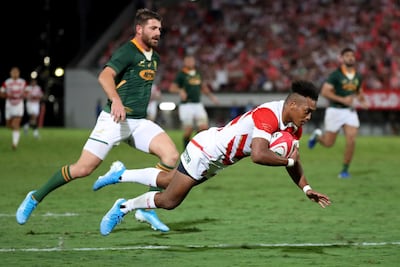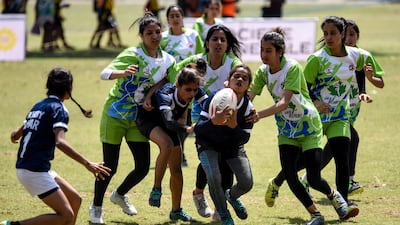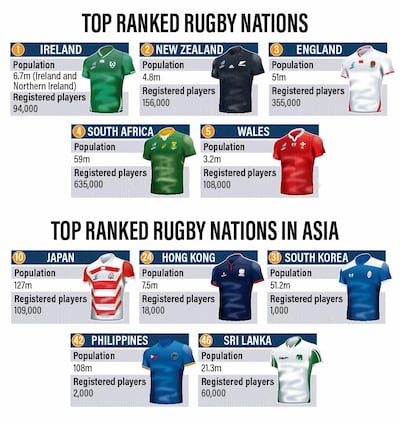Back in 2011, as he was preparing his Japan side to play at the Rugby World Cup in New Zealand, John Kirwan pondered the importance of the coming years for the sport in Asia.
“Having two of the next three World Cups in this part of the world, and the inclusion of rugby sevens in the Olympics, will help ensure more Asian kids are exposed to rugby,” Kirwan, the former New Zealand player, said.
“You have to believe many other Asian nations will emerge as forces in world rugby in the next decade or so.”
How to quantify “forces”? Eight years on, Asia is about to stage its first Rugby World Cup. Yet only one side from the world’s most populous continent will be playing in it.
It is same side – hosts Japan – who have played at every World Cup since the tournament’s inception and never made it beyond the group stages.
Hong Kong have been the template for developing rugby nations, in Asia and beyond. They made it to the final qualifying tournament for the World Cup, a four-team shoot-out in France last year.
It was an admirable achievement for them to make it that far, but they could not make it beyond a tournament that also included Canada, Germany and Kenya. And after them, Asia’s sides were qualification also-rans.
If Asia represents the future of rugby, it is taking a while to arrive. Its first World Cup feels like it might be seminal for the sport on the continent.
Bill Beaumont, the former England captain who is now the chairman of World Rugby, says it is a “once-in-a-lifetime opportunity to grow rugby in Asia”.
“The World Rugby Council awarded the Rugby World Cup to Japan because we believed that it could be a powerful game-changer for sporting and social change in Asia,” Beaumont said this week.
Mils Muliaina, the 100-cap former All Black, played club rugby in Japan for three seasons towards the end of his playing career.
He admits he struggled to adapt to playing in a country where standards of achievement were so far behind what he was used to back home in New Zealand.
And yet he is sure they will do a fine job of hosting the World Cup, citing the excellent organisation of the 2002 football version, and believes the effects will be lasting.
“You only have to look at how the football World Cup was there, and how the game grew after to see what could happen,” Muliaina said, speaking in Dubai last week.
“Football is huge now in Japan. They are going to do a magnificent job. The Japanese get things done. They are very orderly in what they do. They are willing to work to make sure everything is run really well.
“I definitely think there is scope for it to continue in Asia, and Japan have certainly set the tone in terms of what they have done.”
It is fair to expect a boost in the sport's popularity in Japan as a result of the World Cup, but what of the rest of Asia?

According to the independent research company Nielsen, there are already 112 million rugby fans in Asia, which is more than any other continent.
Asia Rugby, the governing body for the sport in the region, are not just waiting around and hoping to reap the fruits of the World Cup.
They begun their “legacy planning” way in advance, most notably via the “Asia 1 Million” programme. As the name suggests, they wanted to introduce rugby to a million new participants.
Ben van Rooyen, the UAE-based rugby development consultant for Asia Rugby, says the success of the programme has exceeded even their expectations.
“We wanted to reach the million figure by approximately the time of kick-off in the Rugby World Cup, but we actually reached the figure last year,” Van Rooyen said. “It took us by surprise. It grabbed the imagination of all the unions across Asia.
"Of course, we focused on the ones with infrastructure and numbers, like India, Pakistan and China. But then everybody came to the party, from the smallest ones like Macau and Kyrgyzstan, to the very biggest.”
So far, there have been 1.8 million new participants in Asia since 2016. That means new players who have been given a chance to try the sport.
Asia Rugby plan to reassess in 2020, and hope to have retained at least 20 per cent as regular active rugby players.
While Japan accounts for the largest amount of new recruits, Van Rooyen is delighted with the enthusiasm for the game shown in countries with little association for the game.
In India, 166,000 children were introduced to rugby in 2018, up from the 11,000 that tried the game in 2013. Nearly half of them were women.
Similarly, Pakistan had 1,400 in 2013, but the figure ballooned to 116,000 last year. In addition, 150 teams within the Pakistan Army play rugby regularly.
“Pakistan was unbelievable for the excitement it has created,” Van Rooyen said. “Pakistan cricket don’t have to worry about doing homework and running awareness programmes about cricket. It is part of the fibre of the culture.
“Cricket is the top three sports in Pakistan, but Pakistan Rugby took the sport to areas where kids had never been exposed to sports other than cricket.”
Whether the sport really takes hold in the emerging countries remains to be seen. But Van Rooyen, who was previously a rugby development officer for the UAE Rugby Federation, points to evidence from this country as a reason to believe anything is possible.
“I remember my first days with UAE Rugby, going into schools and them saying, ‘You will never be able to coach in these schools’,” Van Rooyen said.
“To think that rugby is now in the school curriculum is amazing. By the end of this year, there will be 120,000 Emirati kids who know what rugby is, and who will have played a little bit.
“You can’t expect all of them to become rugby players, but at least they have a foundation. The Ministry of Education will also see the benefits of functional movement and physically literacy rugby brings.”


